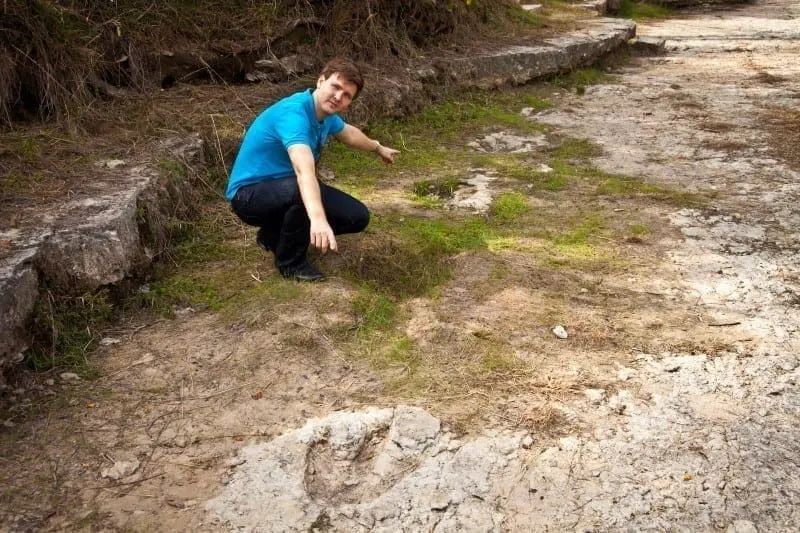[Originally published as Human Fossils: Why Don’t We Find Humans Buried With Dinosaurs?]
Our ministry receives this question frequently, but few seem to see that inherent assumption upon which the question is based: the assumption that we should in fact find human fossils with dinosaur fossils because they were living in proximity at the time of the Flood. Once that’s exposed, possible answers become clearer. Science writer Brian Thomas explains:
Many assume that dinosaur layers should also contain human fossils. Not at all. Dinosaur fossil layers contain sea, swamp, and lake plants and animals, and mostly water birds. They have virtually no remains of land-dwellers like dogs, deer, bears, or bunnies. Humans live on solid ground, not in swamps [wetlands]—and definitely not in pre-Flood swamps where dinosaurs might treat them as light snacks. The best places to look for fossils of pre-Flood humans would be in deposits that contain land-dwellers like pre-Flood dogs and deer.[i]
As a case in point, one of the largest mass dinosaur bonebeds in the world is at Dinosaur Provincial Park in Canada. This massive Flood deposit has 49 different species of dinosaurs buried along with turtles, crocodiles, fish, flying reptiles, birds, and small mammals.[ii] This is not exactly a place where humans would want to live—not then; not today. Four other important factors help answer this question:
Factor 1: Fewer People
While we don’t know the pre-flood human population, most researchers would say that it was much smaller than the 7+ billion people on earth today. Also consider that humans had also not likely spread outside of the area that it currently called Mesopotamia yet.
Factor 2: God wanted to wipe out everything
Consider God’s promise to wipe humans off the face of the earth: “I will destroy man whom I have created from the face of the earth, both man and beast, creeping thing and birds of the air…” (Genesis 6:7). The Flood mechanisms that He used (see Noah’s Flood: Catastrophic Plate Tectonics) were the best possible way to scrub humans from existence. Rapidly spreading sea floor sunk beneath the continents. This produced cycles of tsunamis that catastrophically wiped out vast populations of life. This caused, for example, the Morrison Formation, filled with dead dinosaurs mixed with marine life, to cover a 13-state region in the middle of the U.S. This process resulted in an average sediment thickness of about one mile around the globe and 75% of earth being covered with sedimentary layers.
Factor 3: Sea Creatures are the Norm
When looking at the fossil record as a whole, humans (and even apes) are extremely rare. In fact, the entire primate order represents a mere 3% of the fossil occurrences in the currently known fossil population on record.[iii] This is because about 95% of all fossils are marine invertebrates, mostly shellfish like clams. Of the remaining 5%, 95% are algae and plant fossils (5% x 95% or 4.75% of the total) and 5% (5% X 5%, or 0.25% of the total) are insects and other non-marine invertebrates and vertebrates. Of the remaining 0.25% of the total, 95% are insects and other non-marine invertebrates and only 5% (5% x 0.25%, or 1.25% of the total) are vertebrate fossils (mostly fish, and finally, amphibians, reptiles, birds, and mammals).[iv]
Factor 4: It’s Hard to Fossilize a Human
Fossilization requires quick and complete burial. During the onset of the Flood, humans may have tried to save themselves any way possible. It is probable that during the months of rising Flood waters, humans moved to higher ground. Then, as the humans and other animals died, many might have been washed away at the end of the Flood when the mountains rose and the waters rushed off of the earth (Psalm 104:8).[v]
Geologist Dr. Tim Clarey’s new research on continent-wide rock layers (based on drill core and seismic data) reveals that many Cenozoic deposits lie offshore since Flood waters washed off of continents and into today’s oceans.[vi] If many of the fossils are in layers trapped beneath the sea, they would of course be difficult to find.
Footnotes
[i] Brian Thomas, “Where Are All the Human Fossils?” (August 31, 2018). Institute for Creation Research: www.icr.org/article/where-are-all-the-human-fossils/ (November 5, 2018).
[ii] Dinosaur Provincial Park-World Heritage Site (www.albertaparks.ca/media/4499676/dinosaur_pp_-_fact_sheet.pdf) (November 5, 2018).
[iii] Fossilworks.org as of October 19, 2018.
[iv] J.D. Morris, Is the Big Bang Biblical? (Green Forest, AR: Master Books, 2003): 108–109; and J.D. Morris, The Young Earth (Green Forest, AR: Master Books, 1994): 70. Statistics provided by paleontologist Kurt P. Wise, Ph.D. Geology (Paleontology).
[v] T.L. Clarey & D.J. Werner, “Use of sedimentary megasequences to re-create pre-Flood geography.” In Proceedings of the Eighth International Conference on Creationism (ed. J.H. Whitmore) Pittsburgh, Pennsylvania: Creation Science Fellowship ( 2018): 351–372.
[vi] T.L. Clarey, “Local Catastrophes or Receding Floodwater? Global Geologic Data that Refute a K-Pg (K-T) Flood/post-Flood Boundary.” Creation Research Society Quarterly, 54 (2) (2017): 100-120.






